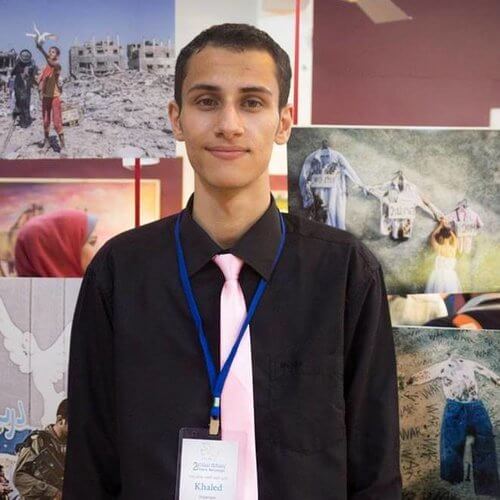Last year, I read about 100 novels, and all of them were in PDF format. So far this year I have finished 152 novels (plus about 10 nonfiction books), all of them also in PDF format. If you have tried to read an entire book that’s in PDF, you know it’s very awkward for pleasure reading. (Yes, I know a lot of foreigners love their Kindles, but we don’t have them or even many iPads here in Gaza. Try reading books on your laptop or mobile phone. But even if I had one of the new digital devices made just for reading, I am pretty sure I’d prefer a paper book.)
I don’t want to read books this way, but I have no other choice. In Gaza, we have no free library where people can check out books. We have two bookstores, but it’s beyond my budget to buy as many books as an avid reader like myself could consume. It helps that I have a good friend who also loves to read; we make sure that when we buy books we select different ones so we can exchange them.

Khaled Al-Ostath (Photo: We Are Not Numbers)
My friend and I are not the only people in Gaza who are in love with reading, but because of the scarcity of hard copies, most of us must read online or from PDF print out, rather than curling up with a book in our hands. This is a severe problem because we have electricity for less than eight hours a day, and when we do have power, typically it comes on after 11 p.m. If you fall asleep before then—which happens most of the time, especially in winter–you miss the opportunity to recharge your laptop, and you may not be able to read again until the next night.
In Gaza, there is a coffee shop called Cordoba that has a small library for its patrons. This coffee shop offers just a small collection of books. Most of them are in Arabic, and I have read just about all of them. So sometimes I print out a PDF and go to the shop to drink coffee and read off paper, like a normal person anywhere else in the word. I try to go to Cordoba for my book- reading “fix” once or twice a week, but it depends on how busy I am. There are times when I don’t go for weeks on end because I’m really busy with my volunteering and university work. But I get very book-hungry when that happens.
My university has a library, but the books it holds are out of date and there are few novels by popular authors. You can hardly find a book by William Shakespeare, Charles Dickens or Agatha Christie, and novels by contemporary writers like John Green, the author of “The Fault in our Stars,” are impossible to find.
The university library does carry a selection of books about reading and writing, and I have read all of them. For example, here’s an excerpt from Principles of Bringing Up Children, a Koran-based guide by Ayatullah Ibrahim Amini. In Chapter 72, “The Habit of Reading Books,” the author writes:
A good book always has a salutary effect on the mind of a reader. It will elevate spirit and thoughts. It will augment his store of knowledge. Books help in correcting moral ineptitude. Particularly in these days of mechanical existence, when people have hardly any time to attend meetings and symposia, the best source of acquiring religious and general knowledge are books that can be browsed whenever a person finds some time to spare. It is possible that the reading of books might have a deeper impact on the minds of the readers than other sources of acquiring knowledge.
I agree with the writer. Reading makes me feel alive. The more I read, the more I fall in love with new characters; it’s like I am making new friends. When I read I feel as though I can overcome my problems, my frustrations and my tendency to over-think my life.
In fact, in the summer of 2014—during that miserable time of shelling, bombardment and death—I read day and night. It was a way for me to cope. I was reading on my small phone; it really hurt my eyes. I vividly remember a nightmarish evening when I was reading a book called “Peace” by science fiction writer Gene Wolfe. It is the story of a man growing up in a small Midwestern town in the early to mid 20th century. The narrator, Alden Dennis Weer, relates his memories from childhood, early adulthood, middle age and old age. I was deeply engrossed in reading when suddenly a building nearby was hit by a ferocious rocket. The ground shook underneath my feet. I remember thinking to myself, “I wish this Alden fellow would come and see how the hell we live here!”
Although my desire to read is often thwarted, I feed my passion in many ways. For example, I post on Facebook quotes from books I have read. I constantly search the Internet for novels by new authors. I lead book discussions at my university. I look on YouTube for videos of authors reading their work. And I search for photographs of the great libraries in the world, such as the ones in London; Washington, DC; and Alexandria, Egypt.
I ask myself: Could I be lucky enough to visit these places one day? Or, because I am Gazan, will it forever be denied me to go overseas and experience the reality of these places? I yearn to have a decent library in Gaza and for a good environment in which to read. Is this too much to hope?
This post was originally published by the We Are Not Numbers project.
Source Article from http://mondoweiss.net/2015/12/lovers-simple-dream
 RSS Feed
RSS Feed















 December 8th, 2015
December 8th, 2015  Awake Goy
Awake Goy  Posted in
Posted in  Tags:
Tags: 













